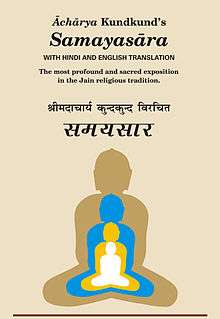Samayasāra
| Samayasāra | |
|---|---|
 | |
| Information | |
| Religion | Jainism |
| Author | Kundakunda |
| Language | Prakrit |
| Period | 1st century B.C. |
| Verses | 439 |
| Part of a series on |
| Jainism |
|---|
 |
|
Jain prayers |
|
Ethics |
|
Major sects |
|
Festivals |
|
|
Samayasāra (The Nature of the Self) is a famous Jain text composed by Acharya Kundakunda in 439 verses.[1] Its ten chapters discuss the nature of Jīva (pure self/soul), its attachment to Karma and Moksha (liberation). Samayasāra expounds the Jain concepts like Karma, Asrava (influx of karmas), Bandha (Bondage), Samvara (stoppage), Nirjara (shedding) and Moksha (complete annihilation of karmas).
Contents
Invocation
The first verse (aphorism) of the Samayasāra is an invocation:
O bhavyas (potential aspirants to liberation)! Making obeisance to all the Siddhas, established in the fifth state of existence that is eternal, immutable, and incomparable (perfection par excellence), I will articulate this Samayaprābhrita, which has been propounded by the all-knowing Masters of Scripture.[2]
The Soul
The real self is only that soul which has achieved ratnatraya i.e. Samyak Darshan, Samyak Gyan and Samyak Charitra. These state when soul achieves purity is Arihant and Siddha.[3] It can be achieved by victory over five senses.
Stoppage of Karmas
According to Samayasāra:
The Self, by his own enterprise, protecting himself from virtuous as well as wicked activities that cause merit and demerit, and stationing himself in right faith and knowledge, detached from body and desires etc., devoid of external and internal attachments, contemplates on the Self, through his own Self, and does not reflect upon the karmas and the quasi-karmic matter (nokarma); the Self with such distinctive qualities experiences oneness with the Self. Such a Self, contemplating on the Self, becomes of the nature of right faith and knowledge, and being immersed in the Self, attains, in a short span of time, status of the Pure Self that is free from all karmas.— Samayasāra (187-189)[4]
Commentaries
It has a number of commentaries on it including Atmakhyati of Acharya Amritchandra and Natak Samayasar of Banarasidas.
See also
Notes
References
- Vishuddhasagar, Acharya (2014), Samay Deshna (PDF)
- Jain, Vijay K., ed. (2012), Acharya Kundkund's Samayasara (in Prakrit, Hindi, and English), Vikalp Printers, ISBN 81-903639-3-X
- Chakravarti, Prof. A. (2008), Acharya Kundkund's Samayasara, Bhartiya Jnanpith, ISBN 978-81-263-1557-4
- Johnson, W. J. (1995), Harmless Souls: Karmic Bondage and Religious Change in Early Jainism with Special Reference to Umāsvāti and Kundakunda, Motilal Banarsidass Publ., ISBN 81-208-1309-X
- Jaini, Padmanabh S. (1991), Gender and Salvation: Jaina Debates on the Spiritual Liberation of Women, University of California Press, ISBN 0-520-06820-3
- Kundakunda, Acharya (1950), Samayasara or the Nature of the Self, Bharatiya Jnanapitha
- ग्रन्थाधिराज: "श्री समयसार जी", Aadhyatmik Prayogshala
- Samaysaar (Samayasāra) in prakrit, sanskrit, hindi and gujarati text in pdf format can be found at
